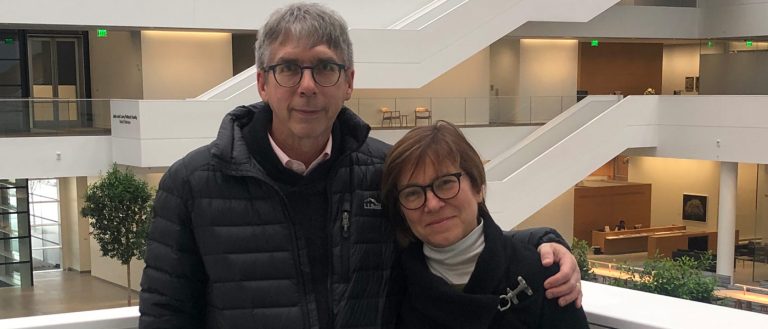For alumni John (MED ‘86) and Catherine (CWR ‘77, NUR ‘81) Seibyl, collaboration and partnership go beyond their bond to each other. Thanks to a transformative $7.5 million commitment to Case Western Reserve University, it now extends to their respective schools in support of multidisciplinary research in neurodegenerative disease.
The gift, to be used strategically and collaboratively with the School of Medicine and the Frances Payne Bolton School of Nursing, will substantially enhance the university’s ability to—in the words of Catherine Seibyl—”create ripple effects” that benefit patient outcomes in Alzheimer’s disease, Parkinson’s disease and multiple sclerosis.
“For us, philanthropy is the art of recognizing in humanity an essential connectedness which in our giving we raise up in the celebration of creating new possibilities,” said Catherine Seibyl. “This gift affirms the past by laying plans for the future, making an investment in a future that can be as bright as it can be dark, can be as ebullient and joyous as tragic or absurd, but uncertainty notwithstanding, always recognizes that we interconnect as receivers and as givers.”
For the two alumni—who were married on campus at Amasa Stone Chapel a week after John earned his degree—the gift exemplifies their shared commitment to lifting others.
“John and Cathy Seibyl already have done so much for so many through their respective professions,” Interim President Scott Cowen said. “This commitment further extends their impact by encouraging interdisciplinary efforts around neurodegenerative disease. We are deeply grateful for this opportunity to make a meaningful difference for people with multiple sclerosis, Alzheimer’s disease and Parkinson’s disease.”
After earning his degree at CWRU, John Seibyl joined Yale University’s School of Medicine, eventually serving as Chief of the Section of Nuclear Medicine and later co-founding the Institute for Neurodegenerative Disorders, an independent nonprofit and Molecular Neuroimaging, LLC (now Invicro, a Konica-Minolta company). Catherine Seibyl worked as a pediatric nurse practitioner, oversaw the evaluation of residential treatment programs for veterans with mental illnesses and conducted epidemiological research.
At the core of the Seibyls’ gift is the appeal of elevating joint research by the two schools that prepared them for their professional pursuits. Of the $7.5 million commitment, $2 million will fund the John Seibyl, MD, Professorship in Neurodegenerative Research within the School of Medicine, while an additional $2 million will support the Catherine Seibyl, BSN, MSN, MPH, Professorship in Nursing, Research and Caregiving.
“This transformative gift from John and Cathy Seibyl represents a turning point in our ability to aid individuals experiencing or at risk for neurodegeneration across the age spectrum,” said Stan Gerson, interim dean for the School of Medicine. “By linking efforts in basic research to translational models of disease—informing clinical input and clinical investigation with an emphasis on caregivers and wellbeing—will benefit our entire community. We will unite the School of Medicine, Engineering and Nursing to coordinate this cutting-edge research.”
The John and Catherine Seibyl Fund for Neurodegeneration Innovation in Research, Care and Education, will be supported by an additional $2.5 million and will provide support for multidisciplinary research and training in neurodegenerative diseases within the two schools to enhance understanding, promote education, and improve the care and treatment of afflicted persons and families.
Finally, $1 million will be used to establish two endowed funds—The John Seibyl, MD, Fellowship in the medical school and The Catherine Seibyl, BSN, MSN, MPH, Fellowship at the nursing school— respectively, to support the training of the next generation of research scientists in brain health.
“Through the generosity of John and Catherine Seibyl, Case Western Reserve University will have a significant impact on research related to Alzheimer’s, Parkinson’s and multiple sclerosis—improving the lives of patients, their families and friends,” said Carol Musil, dean of the Frances Payne Bolton School of Nursing. “By supporting endowed chairs in both nursing and medicine and catalyzing multidisciplinary research, this gift will be transformative in the ways that we can work together across disciplines to help improve the quality of life and the quality of care, and bring more awareness and understanding of these diseases to the public consciousness.”
Together, the individual areas of focus supported by this gift will have a lasting impact on CWRU’s schools, faculty and students—repeating the cycle of giving through the advancement of research.
Explained John Seibyl: “At some point we might look back and consider, however immeasurable, whether we were fortunate enough to have done more benefit than harm, that the world might be slightly better by the light of our presence, and in the end smile, knowing our work was good.”


